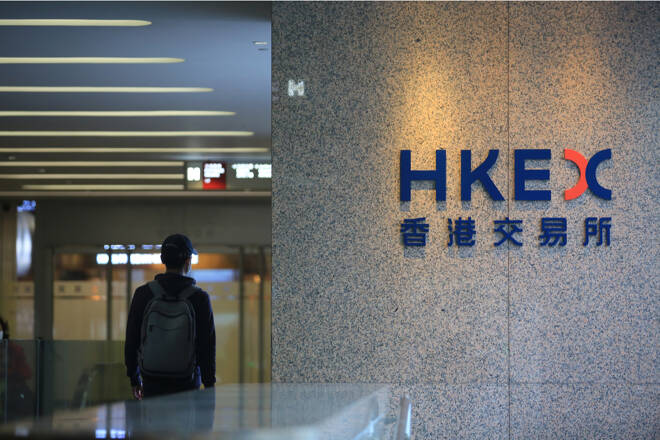Advertisement
Advertisement
Hang Seng Index, ASX 200, Nikkei 225: A Bank of Japan Pivot from Negative Rates?
By:
Tuesday's focus: China's PMI numbers, vital for market sentiment. BoJ's inflation forecast revision and Middle East updates add to market dynamics.
Key Insights:
- The ASX 200 and Nikkei 225 ended the Monday session with losses, while the Hang Seng Index bucked a bearish market trend.
- On Tuesday, the Bank of Japan and private sector PMIs from China will influence market risk sentiment.
- The Middle East conflict will also be a focal point.
Overview of the Monday Session
On Monday, the Hang Seng Index bucked the broader market trend, ending the day in positive territory. However, the ASX 200 and the Nikkei saw red, with Middle East jitters and bets on hawkish RBA and Bank of Japan (BoJ) policy maneuvers.
US economic indicators from Friday and fears of an escalation in the Middle East conflict added to the negative market sentiment. While the US economy enjoyed a stellar third quarter, a fall in disposable income discounted better-than-expected personal income and spending figures from Friday.
On Friday, the Nasdaq Composite Index gained 0.38%. The Dow and the S&P 500 ended the session with losses of 1.12% and 0.48%.
On Monday, the Asian economic calendar contributed to the ASX 200 losses. Higher-than-expected retail sales figures fueled bets on an RBA rate hike following a pickup in inflationary pressures. Investor bets on a BoJ pivot from ultra-loose monetary policy and a weaker USD/JPY contributed to the Nikkei losses.
The Bank of Japan and China in Focus
The Tuesday session could be a pivotal session for the Asian equity markets. Private sector PMI numbers from China will garner investor interest early in the session.
Investors expect an improving macroeconomic environment. Weaker-than-expected NBS private sector PMIs could impact market risk appetite. The Asian equity markets remain exposed to the risk of a failed Beijing stimulus reboot.
However, the Bank of Japan and Middle East news updates will influence market risk sentiment. Investors anticipate the BoJ to revise inflation forecasts. After the hotter-than-expected Tokyo inflation numbers, a less dovish BoJ could test the appetite for Nikkei-listed stocks.
Overnight gains across the US equity markets will offer early support. The S&P 500 and the Nasdaq Composite Index rose by 1.20% and 1.16%, with the Dow gaining 1.58%.
In the Futures Markets, the ASX 200 was up 29 points, while the Nikkei 225 declined by 130 points.
ASX 200
The ASX 200 declined by 0.79% on Monday. The S&P/ASX All Technology Index (XTX) fell for a ninth consecutive session on hawkish bets on the RBA. Bank stocks contributed to the losses on fears of a spike in non-performing loans.
On Monday, the National Australia Bank (NAB) and the Commonwealth Bank of Australia (CBA) saw losses of 1.83% and 1.62%. Westpac Banking Corp (WBC) and ANZ Group (ANZ) fell by 1.02% and 1.21%.
Oils stocks also tumbled. Woodside Energy Group (WDS) and Santos Ltd (STO) ended the day with losses of 2.53% and 2.04%.
Mining stocks offered modest support. Fortescue Metals Group (FMG) rose by 0.11%. Rio Tinto (RIO) and BHP Group Ltd (BHP) gained 0.48% and 0.11%.
Hang Seng Index
The Hang Seng Index gained 0.04% on Monday.
Alibaba Group Holding Ltd (HK:9988) fell by 0.67%, while Tencent Holdings Ltd (HK:0700) gained 0.89%. Bank stocks ended the day in negative territory.
HSBC Holdings PLC (HK:0005) declined by 1.46%. The Industrial and Commercial Bank of China (HK:1398) and China Construction Bank (HK:0939) slid by 2.86% and 1.75%.
Nikkei 225
(Graph for reference purposes only)
The Nikkei fell by 0.95% on Monday.
Sumitomo Mitsui Financial Group (8316) and Mitsubishi UFJ Financial Group (8306) declined by 2.57% and 1.95%, respectively. However, the main components had a mixed session.
Fast Retailing Co (9983) and KDDI Corp. (9433) declined by 1.38% and 1.16%, with SoftBank Group Corp. (9984) falling by 0.39%.
Tokyo Electron Limited (8035) and Sony Corp. (6758) bucked the trend, gaining by 0.97% and 0.83%.
For upcoming economic events, check out our economic calendar.
About the Author
Bob Masonauthor
With over 28 years of experience in the financial industry, Bob has worked with various global rating agencies and multinational banks. Currently he is covering currencies, commodities, alternative asset classes and global equities, focusing mostly on European and Asian markets.
Advertisement
